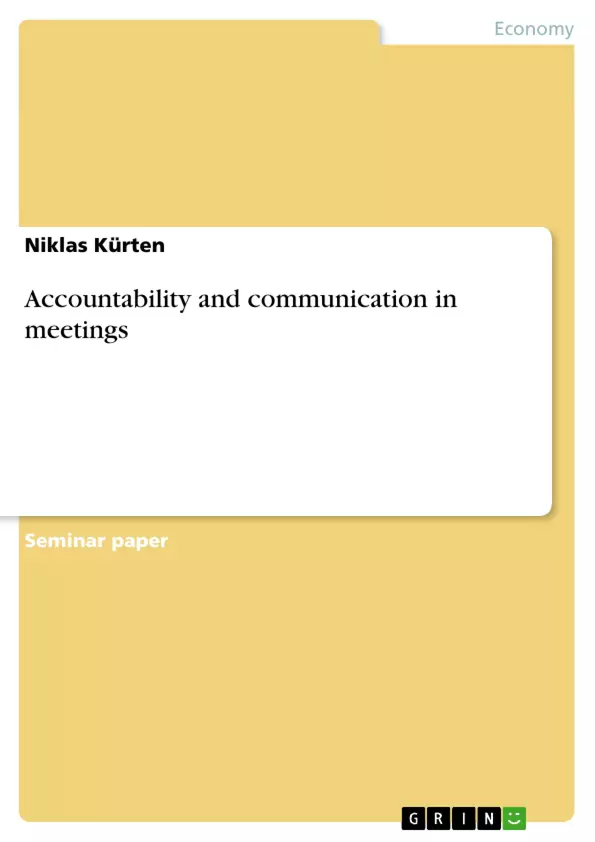In today’s complex societies the issue of communication gets one of the most challenging tasks among human beings. Especially in organizations the role of communication has become a key factor of success and gaining competitive advantage. The presence of communication is represented in every level of a company, ranging from the enterprise to the functional level. Meetings are used as intermediaries to find ways through implement company missions and visions from the strategic to the operational level.
The following meeting arranged by the management is intended to involve all consultants to participate and take responsibility of increasing assignments but Göran is in argument with Torbjörn and MD Bertil. Torbjörn and Bertil expect Göran not only to arrange a LOOP-seminar and write sales letters about LOOP, which is what he proposed on the meeting, but also to take the responsibility of sending letters in addition to the general letter. The intentions of Bertil and Torbjörn were to get everyone to participate and to take on responsibility for increasing assignment, as well as to result in more sales initiatives.
The goal of the following paper is to analyze the above mentioned meeting and its outcome out of two different perspectives. To reach this goal, first the problems during the meeting as well as the roles of the participants in the meeting are described, analyzed, and interpreted out of a perspective which focuses on the decision-making process itself. Second, several recommendations to improve the way of making decisions and the effectiveness of meetings are provided. Third, an analysis of the meeting with the focus on the use of accounts during the discussion is provided before ending with the conclusions. Additionally, it can be remarked that the analysis is mainly based on the theory of the textbook ‘organizational communication’ written by Katherine Miller as well as the literature provided in the task.
Inhaltsverzeichnis (Table of Contents)
- Introduction and Way of Investigation
- Problems and Roles during the Meeting
- Recommendations
- Results of the Meeting out of the Account-focused perspective
- Conclusions
Zielsetzung und Themenschwerpunkte (Objectives and Key Themes)
The main objective of this paper is to analyze a meeting within a consulting company, focusing on the communication dynamics and decision-making process. It investigates the meeting from two perspectives: the decision-making process itself and the use of accounts during the discussion. The paper aims to identify problems and shortcomings in the meeting, provide recommendations for improvement, and analyze the meeting's outcome through the lens of account-focused communication.
- Communication dynamics and their impact on decision-making
- Roles and responsibilities of participants in a meeting
- Effective communication strategies in a team environment
- The use of accounts in organizational communication
- The consequences of ineffective communication and decision-making
Zusammenfassung der Kapitel (Chapter Summaries)
Introduction and Way of Investigation
This chapter sets the context for the analysis by highlighting the importance of effective communication in organizations and the role of meetings in facilitating decision-making. It introduces the specific meeting under analysis, outlining the participants, the topic, and the overall goal of the paper.
Problems and Roles during the Meeting
This chapter delves into the problems and shortcomings identified during the meeting, focusing on the roles and behaviors of the participants. It analyzes how their communication styles and interactions contribute to the ineffective outcome of the meeting.
Recommendations
This chapter proposes recommendations to improve the decision-making process and the effectiveness of meetings, addressing the specific challenges observed in the analyzed meeting.
Schlüsselwörter (Keywords)
Key terms and concepts addressed in this paper include organizational communication, meeting dynamics, decision-making process, account-focused communication, conflict management, leadership styles, communication roles, and effective team communication.
Frequently Asked Questions
What is the main objective of this organizational communication paper?
The paper aims to analyze a specific management meeting within a consulting company to identify communication problems and improve decision-making effectiveness.
What perspectives are used to analyze the meeting?
The meeting is analyzed from two perspectives: the decision-making process itself and the use of "accounts" (justifications/explanations) during the discussion.
What common problems in meetings are addressed?
The paper discusses conflicts between participants (e.g., Göran vs. Torbjörn and Bertil), issues with taking responsibility, and ineffective communication roles.
What role does communication play in gaining a competitive advantage?
According to the abstract, effective communication is a key factor for success in complex societies, helping organizations implement their missions from a strategic to an operational level.
Which theoretical framework is the analysis based on?
The analysis is primarily based on Katherine Miller's textbook "Organizational Communication."
What are the recommendations provided in the paper?
The paper provides specific recommendations to improve the decision-making process and the overall effectiveness of corporate meetings.
- Citation du texte
- Niklas Kürten (Auteur), 2006, Accountability and communication in meetings, Munich, GRIN Verlag, https://www.grin.com/document/79071



